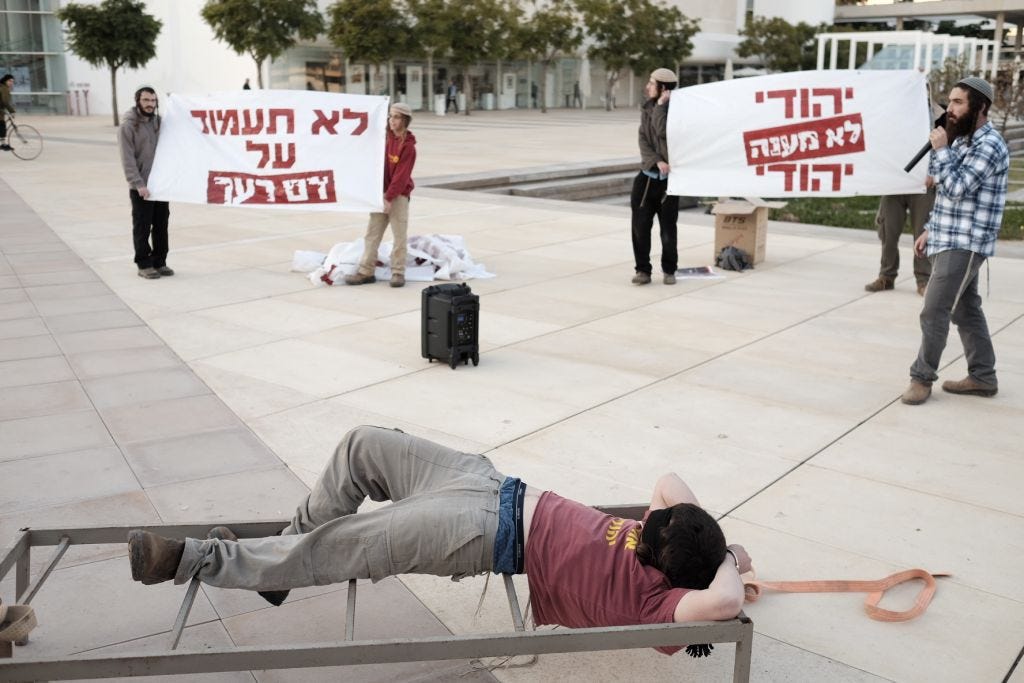Not Every Mitzvah Deserves A Song

This is a uniquely difficult time for our nation. Usually, it is the non-Jews that are our enemies. But right now, it is a team of Jews who are exhibiting appalling and brutal behavior. Even more confusingly, while everyone agrees with the previous sentence, there is a distinct split regarding who it refers to. Some would take it as referring to the Shabak, while others would take it as referring to the people dancing with guns and worse in the notorious wedding video. There may even be some people who take it as referring to both, but not many.

Before I address one of the theological aspects of this topic, I should clarify my position regarding the politics/ conspiracy theories. First: I am very right-wing, politically. Second: I am well aware of the notorious history of the Shabak, especially with provocateur Avishai Raviv. Third: Much of my immediate family are right-wing settlers in the West Bank. Fourth: Before writing any of this, I consulted with a reliable source who is connected with the leaders of the Yesha communities. I was told as follows: The vast majority of Yesha residents were as shocked and horrified by the video as everyone else. My Yesha relatives have never, ever seen people dance with guns, let alone the worse things shown in the video. (Regarding the impropriety of dancing with guns, see my post Swords, Guns and Judaism.) However, the Yesha leadership, who have been engaging in extensive discussions with the security services, did accept that there does indeed exist a small fanatic group. To claim, as some do, that the notorious video is only showing Shabak agents dressed up, is a silly conspiracy theory, tragically advanced by those who cannot bring themselves to accept that "their side" might have any serious problems.
But I want to deal with the theological aspects of something incontrovertible and much more widespread: the song about Shimshon's declaration of revenge against the Philistines. This song has been quite popular in some right-wing circles for at least fifteen years. Some are astonished that any religious person could challenge its legitimacy - after all, it is a verse from Tanach! And Shimshon was surely carrying out the will of God!
Yet carrying out the will of God is not always something to sing about. As I wrote in the post Killing In The Name Of God, a mitzvah involves two components; obeying God’s words, and committing an act. One can feel satisfaction at fulfilling God’s command at the same time as feeling revulsion at committing an act.
Before giving examples, let us look at a parallel concept in the world at large. We certainly find that one can commit an act which one feels to be ultimately good, and to take pleasure in that knowledge, even while the performance of the act is itself brutal and repulsive. The simple example is a surgeon or a dentist. The dentist is happy to be healing someone, even though drilling out his tooth is a brutal, painful act. You wouldn't want to go to a dentist who sings about how much he enjoys drilling teeth! Judaism likewise acknowledges that certain acts are themselves brutal and unpleasant, even though they are performed for ultimately noble purposes. There is no celebration of bloodshed.
For example, King David was not allowed to build the Temple because of the blood on his hands—notwithstanding the fact that he was absolutely justified and even praised for all the blood that he spilled. And, in a very different sphere, according to many halachic authorities, one does not recite the blessing of Shehechiyanu at the circumcision of one’s son, for the reason is that one cannot pronounce such a declaration of joy at an act that is a source of pain to one’s child.
One case that would appear to contradict our thesis is that of Abraham’s planned slaughter of Isaac. The Midrash tells us how Abraham complied with this command with alacrity, joyous at the opportunity to fulfill the will of his Creator. Yet further analysis and contemplation proves otherwise. The Midrash also tells us that Isaac was blinded by the tears that Abraham spilled. Abraham had mixed emotions; joy at fulfilling the Will of his Creator, grief at spilling the blood of his son. He certainly wouldn't have been singing a song as he did it - "Zip-a-dee-doo-dah, zip-a-dee-A! I'm gonna slaughter my son today!"
Not every mitzvah and not every verse is to be sung about. With all due respect to a certain chassidic singer who is a wonderful person, I don't think that Timcheh Es Zecher Amalek should be made into a upbeat song. (And at a time when people are all too casual about calling other Jews Amalek, one should be especially vigilant about this.)
And neither should Shimshon's declaration of vengeance against the Philistines be something to sing joyously. Opposing that song would be a good first step to impressing upon others - and ourselves - that we will not tolerate any inclination towards celebrating combat. Let's leave such celebrations of violence to the Palestinians, who excel at it.


